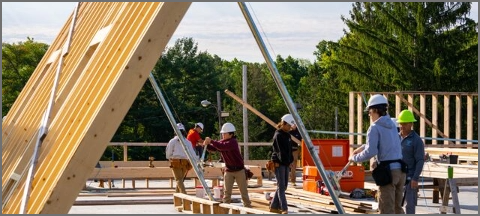Academics
Mathematics Core
Mathematics Core Course Descriptions
Mathematics I – Grade 9
Course #: 2102, 2100 | Level: Honors, CP | Credits: 4
Mathematics I formalizes and extends the mathematics that students learned in Grade 8 and is based on the Massachusetts Mathematics Curriculum Frameworks (2017). Mathematics I offers students the first sequence in what they are expected to learn in preparation for college and career. Instructional time focuses on six critical areas: (1) extend understanding of numerical manipulation to algebraic manipulation; (2) synthesize understanding of function; (3) deepen and extend understanding of linear relationships; (4) apply linear models to data that exhibit a linear trend; (5) establish criteria for congruence based on rigid motions; and (6) apply the Pythagorean Theorem to the coordinate planes. This course integrates Algebra I, Geometry, and Statistics and Probability with an emphasis on real-world applications.
Algebra I – Grade 9
Course #: 2102, 2100 | Level: Honors, CP | Credits: 4
This course addresses the Common Core Standards for Algebra 1. Algebra I focuses on four critical areas: (1) deepen and extend understanding of linear and exponential relationships; (2) contrast linear and exponential relationships with each other and engage in methods for analyzing, solving, and using quadratic functions; (3) extend the laws of exponents to square and cube roots; and (4) apply linear models to data that exhibit a linear trend. (Algebra I discontinued SY 23-24; ACP level discontinued effective SY 22-23).
Geometry – Grade 9
Course #: 2122 | Level: Honors | Credits: 4
This course transitions capable students who have successfully completed Algebra I in Grade 8 to introduce students to the Massachusetts Mathematics Curriculum Framework (2017) learning standards for Geometry. Geometry focuses on six critical areas: (1) establish criteria for congruence of triangles based on rigid motions; (2) establish criteria for similarity of triangles based on dilations and proportional reasoning; (3) informally develop explanations of circumference, area, and volume formulas; (4) apply the Pythagorean Theorem to the coordinate plane; (5) prove basic geometric theorems; and (6) extend work with probability. As the year progresses, students explore more complex geometric situations and deepen their explanations of geometric relationships by presenting and hearing formal mathematical arguments.
Algebra II – Grade 10
Course #: 2232, 2231 | Level: Honors, ACP, | Credits: 4
Continuing the progression for entering Grade 10 students who successfully completed Geometry in Grade 9, this course addresses the Massachusetts Mathematics Curriculum Framework (2017) learning standards for Algebra II. The focus is on the following four critical areas: (1) relate arithmetic of rational expressions to arithmetic of rational numbers; (2) expand understandings of functions and graphing to include trigonometric functions; (3) synthesize and generalize functions and extend understanding of exponential functions to logarithmic functions; and (4) relate data display and summary statistics to probability and explore a variety of data collection methods. Students work closely with the expressions that define the functions, are facile with algebraic manipulations of expressions, and continue to expand and hone their abilities to model situations and to solve equations, including solving quadratic equations over the set of complex numbers and solving exponential equations using the properties of logarithms. (ACP level discontinued effective SY 23-24).
Geometry – Grade 10
Course #: 2202, 2201, 2200 | Level: Honors, ACP, CP | Credits: 4
This course addresses the Common Core Standards for Geometry. Geometry focuses on six critical areas: (1) establish criteria for congruence of triangles based on rigid motions; (2) establish criteria for similarity of triangles based on dilations and proportional reasoning; (3) informally develop explanations of circumference, area, and volume formulas; (4) apply the Pythagorean Theorem to the coordinate plane; (5) prove basic geometric theorems; and (6) extend work with probability. (ACP level discontinued effective SY 23-24).
Algebra II – Grade 11
Course #: 2302, 2301, 2300 | Level: Honors, ACP, CP | Credits: 4
This course is a continuation of algebraic concepts. Topics include functions and graphs and more complex problem solving, complex numbers, matrices to solve linear systems, vectors, analytic trigonometry, and relates the connections between the fundamental concepts of algebra, trigonometry and analytic geometry. Several standards in the Algebra II course were moved to the Enhanced Algebra I course which made it possible to add standards from the Pre-calculus Course to the Enhanced Algebra II course. In this way students will be prepared for Calculus after successful completion of Enhanced Algebra II. This is a course which covers material at a fast pace and in great depth, with the expectation of stronger student performance. A greater emphasis will be placed on algebraic approaches to problem-solving.
STEAM Integration H – Grade 11
Course #: 9300 | Level: Honors | Credits: 8
STEAM (Science-Technology-Engineering-Arts-Mathematics) Integration is full year, double-block course that offers an interdisciplinary, standard-based mathematics and lab-based physics pathway for students who are interested in learning Algebra II through applied integration learning projects with embedded mathematical and physics content and skills. The intention of this course is for students to do highly engaging projects that deepen and extend the connections between the fundamental concepts of algebra, trigonometry, and analytic geometry connected to physics concepts of motion, energy, and electromagnetism. Content learning standards from both the Massachusetts Mathematics Curriculum Framework (2017) and the Massachusetts Science and Technology Engineering Curriculum Framework (2016) provide a foundation for allowing students to experience these standards in real-world problem learning situations. Students will collaborate for two back-to-back blocks with two teachers, one a mathematics teacher and the other a physics teacher to build integration learning projects using problem-solving strategies, questioning, investigating, analyzing critically, gathering and constructing evidence, and communicating rigorous arguments to justify their thinking. Co-teachers will serve as coaches to student-designed integration projects. This course satisfies the requirements for an Algebra II and a lab-based Physics course as stipulated in MassCore. Prerequisites: Successful completion of Algebra 1 and Geometry; Enrollment in the Construction Cluster (Carpentry, Construction Craft Laborer, Electricity, HVAC-R, Masonry, Plumbing), Engineering & Automation Technology, or Advanced Manufacturing.
Precalculus – Grade 11
Course #: 2322 | Level: Honors and ACP | Credits: 4
Continuing the progression for entering Grade 11 students who successfully completed Algebra II in Grade 10 and based on the Massachusetts Mathematics Curriculum Framework (2017) learning standards, this course combines the trigonometric, geometric, and algebraic techniques needed to prepare students for the study of calculus, and strengthens students’ conceptual understanding of problems and mathematical reasoning in solving problems. Facility with these topics is especially important for students intending to study calculus, physics, and other sciences, and/or engineering in college. Because the standards for this course are (+) standards, students selecting this Model Precalculus course should have met the college and career ready standards. Instructional time will focus on four critical areas: (1) extend work with complex numbers; (2) expand understanding of logarithms and exponential functions; (3) use characteristics of polynomial and rational functions to sketch graphs of those functions; and (4) perform operations with vectors.
NOTE: Students who have not met the Competency Determination in Mathematics by earning the equivalent of a Proficient score of 240 or better on the Grade 10 Mathematics MCAS will be required to enroll in Algebra III during Grade 12. For more information see: https://www.doe.mass.edu/ccte/.
Algebra III/Trigonometry – Grade 12
Course #: 2400 | Level: CP | Credits: 4
This course is a continuation of concepts presented in Algebra II. It will emphasize the connection between algebra, geometry and trigonometry. The focus of this course is exponential/logarithmic functions, polynomials, trigonometric functions and trigonometric identities.
Precalculus – Grade 12
Course #: 2402, 2401 | Level: Honors and ACP | Credits: 4
This course addresses the Learning Standards for Precalculus and focuses on four critical areas: (1) extend work with complex numbers; (2) expand understanding of logarithms and exponential functions; (3) use characteristics of polynomial and rational functions to sketch graphs of those functions; and (4) perform operations with vectors.
Calculus – Grade 12
Course #: 2412 | Level: Honors | Credits: 4
This course is for students who have successfully completed Algebra II Enhanced. The course will include a brief review of the critical concepts and skills covered in Algebra II Enhanced followed by the concepts of limit, derivative, and definite and indefinite integral. Techniques of numerical and closed form integration with applications of the definite and indefinite integrals will be studied.
Advanced Placement Calculus AB – Grade 12
Course #: 2443 | Level: AP | Credits: 4
A.P. Calculus AB is a full year mathematics course, structured to closely resemble a first semester Calculus course in college. It is the intent of the course to develop a conceptual understanding and computational fluency in the basics of differential and integral calculus. This course will emphasize basic techniques, problem solving skills, critical thinking, and an understanding of various applications of calculus. Technology will also be emphasized as a problem-solving tool. Students will apply the techniques learned to a variety of different types of functions as well as different representations of functions, and use these to model real-world situations. The course will also introduce basic differential equations, and use them to model growth.





